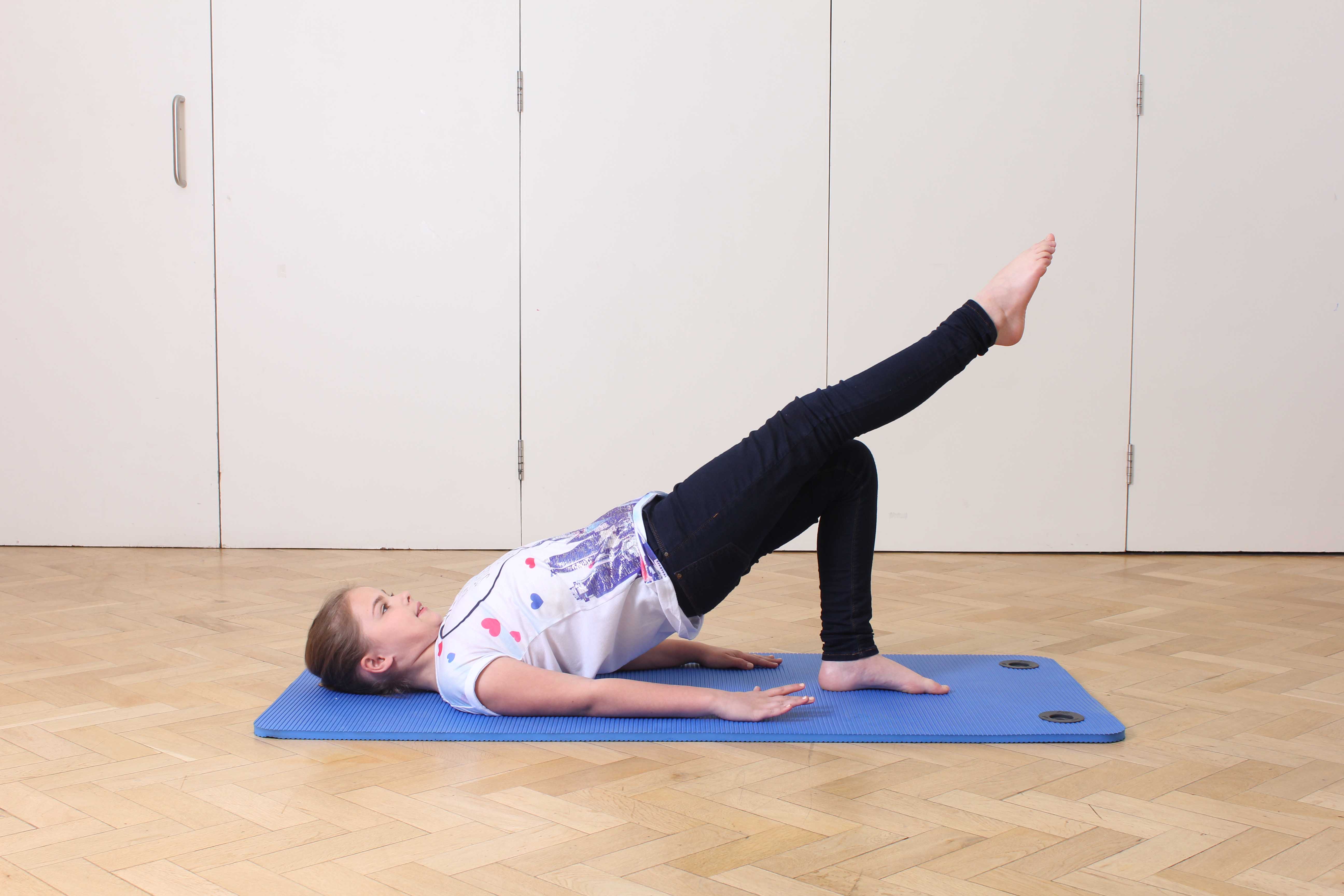What is Perthes’ disease?
Perthes' disease also known as Legg-Calve-Perthes disease or coxa plana is a disease of the hip joint which causes softening and damage to the top of the thigh bone (femoral head) which leads to pain and limping. Perthes’ disease commonly affects children aged between the age of 4 and 8 years and usually occurs in one hip. Over time the bone gradually heals and reforms as the child grows but this can take between two and five years.
The aim of physiotherapy is to ensure that the femoral head regrows back into its normal shape to restore hip function and enhance mobility and quality of life.
 Above: Strengthening and toning exercises for the hip and pelvis supervised by a paediatric physiotherapist
Above: Strengthening and toning exercises for the hip and pelvis supervised by a paediatric physiotherapistWhat causes Perthes’ disease?
Perthes’ disease is caused by a reduced blood supply to the femoral head but the reason for this is unknown. A lack of blood supply means there is not enough oxygen and nutrients to the bone and so the bone cells die. This results in a flattened rather than rounded femoral head, which can fail to fit properly inside the hip socket and affects movement of the hip.
How is Perthes' disease diagnosed?
Diagnosis of Perthes’ can be made by a specialist. Your GP will refer your child to a specialist if it is suspected your child has Perthes’ disease. A confirmed diagnosis is then made following a physical examination of the hip, an X-ray or an MRI scan.
What are the symptoms of Perthes' disease?
Symptoms tend to develop over a period of time and may include:
- Limping which may gradually become worse over a few weeks.
- Pain in the hip and groin area. The pain may be referred to the thigh or knee.
- Stiffness and reduced range of movement of the affected hip.
- Over time the muscles in the affected time may become weaker due to pain and inactivity.
- The affected leg may eventually become shorter than the other leg
Physiotherapy for Perthes' disease
Physiotherapy for Perthes’ disease will promote healing and ensure that the femoral head is positioned well in the hip socket as it heals and regrows. Some children are treated with plaster casts or special braces to keep the femoral head in a good position and are worn for many months. Surgery may be another option in some cases and can improve the shape and function of the hip joint and provide stability of the femoral head in the hip socket.
Conventional physiotherapy for Perthes’ disease
Most children with Perthe’s disease are treated with physiotherapy including exercises and hydrotherapy.
At Physio.co.uk we provide specialist rehabilitation programs for children with Perthes’ disease in order to enhance the movement of the joint, increase muscle strength and keep the femoral head in an optimal position in the hip socket. Physiotherapy treatment at Physio.co.uk will be tailored to your child and will aim to:
- Improve range of movement in the hip
- Increase muscle strength in the muscles in the leg and around the hip
- Reduce pain
- Facilitate mobility and independence with everyday tasks
- Exercises to strengthen muscles in the quadriceps, hamstrings and glutes
- Stretching exercises to increase flexibility of the hip muscles
- Education of a normal (walking) gait patternwith gait training
- Activities to improve balance and coordination
- Low impact activities such as walking and stationary cycling and how to incorporate this into your child’s routine.
- Hydrotherapy helps maximize mobility by improving range of movement and muscle strength.
Physiotherapy following surgery for Perthes’ disease
At Physio.co.uk we also provide physiotherapy following surgery of the hip to improve muscle strength and flexibility and help your child regain ambulation (walking) and function as soon as possible. Physiotherapy at Physio.co.uk will enhance your childs recovery and help your child regain their mobility and independence as soon as possible.
An initial assessment with your physiotherapist at Physio.co.uk will look at your childs range of movement, muscle strength and ability with everyday functional tasks. From this assessment, rehabilitation goals will be developed specific to your child and may include:
- Decreasing pain and swelling
- Restoring and maintaining full range of movement at the hip joint
- Increasing muscle strength
- Improving mobility
- Increasing fitness and endurance
- Promoting independence
- Improving quality of life
- Use of ice and ultrasound. This may be used in the first couple of weeks following your child’s operation to decrease any pain and swelling and promote healing.
- Teaching your child how to mobilise safely and effectively with the use of assistive devices such as crutches.
- Promoting independence with transfers such as getting in and out of bed, getting up and down the stairs.
- Graduated exercise program including active and passive movement to restore the range of movement in the hip and to improve muscle strength.
- Activities to improve your child’s balance and coordination
- Hydrotherapy to help relax stiff muscles, ease pain and maximise mobility.
For more information to see if your child would benefit from physiotherapy or to book an appointment please call 0330 088 7800, or book online today!

 0330 088 7800
0330 088 7800





































